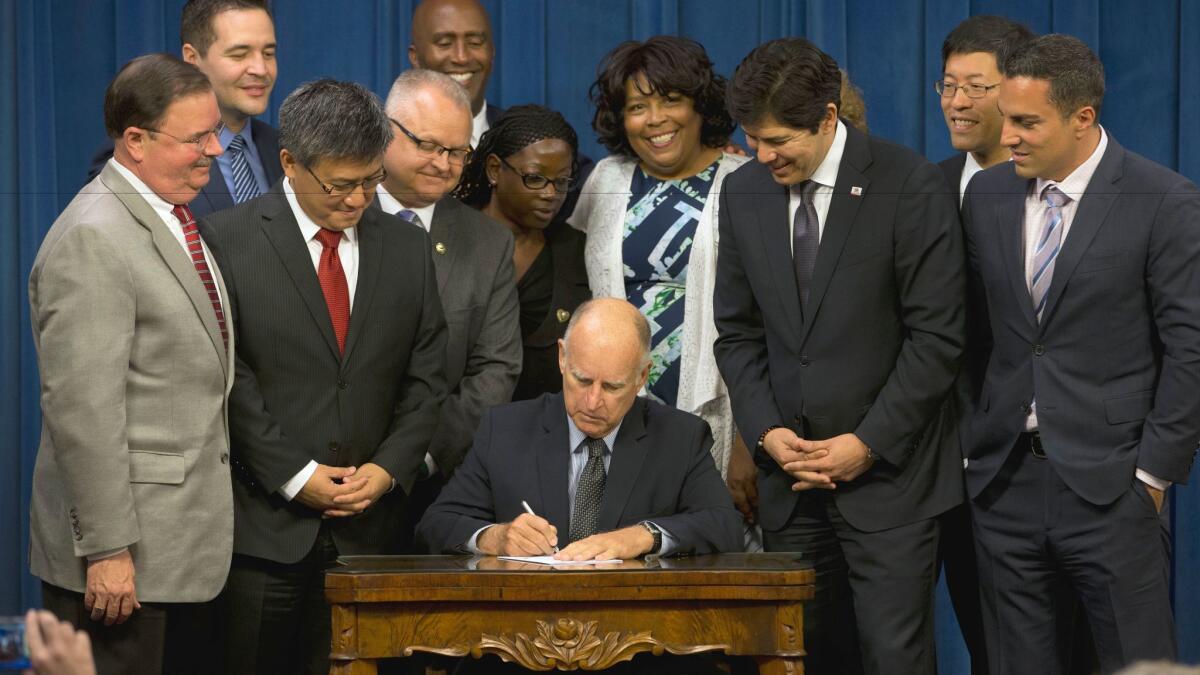Editorial: House Republicans side with Wall Street against the little guy

With an aging population and a growing number of people nearing retirement, it’s scary to think of how little the typical American family has set aside in savings. According to a report last year by the Economic Policy Institute, half of the families with workers in their prime have amassed $17,000 or less in their nest eggs. When their paychecks stop, they’ll have little more than their Social Security benefits to live on, as paltry as they may be.
That’s why California lawmakers, led by Senate President Pro Tem Kevin de León (D-Los Angeles), spent the better part of a decade developing a retirement savings program aimed at low-income Californians who aren’t covered by a pension or 401(k) plan. And that’s why it’s stunning and outrageous that House Republicans are moving to kill the U.S. Department of Labor rule that cleared a legal pathway for such plans.
The vast majority of employers do not offer any kind of help for retirement. Most are relatively small — about 90% of U.S. companies employ 20 or fewer workers. The ones that compete for skilled professionals (think law firms and physician groups) may offer retirement benefits, but the rest typically do not. As a consequence, almost half of American families with workers in their prime aren’t covered by a pension or 401(k) plan, the Economic Policy Institute found. In California alone, an estimated 7.5 million workers fall into this category.
The California Secure Choice plan that lawmakers approved last year would require businesses that don’t offer retirement plans to enroll their workers in new, state-administered Individual Retirement Accounts unless the workers opted out. A private firm overseen by a state board would pick the investment options, but workers would decide what percentage (if any) of their paycheck to contribute and which specific funds to invest in.
The state’s approach is supported by a Labor Department ruling in August that a 1974 federal law governing employer-sponsored retirement plans does not apply to certain state-administered IRAs for workers. The ruling reflects the fact that employers are not involved at all in the administration of the Secure Choice plans; instead, they simply distribute information about them and help their employees enroll or opt out.
The only opposition to the final version of California’s plan came from lobbyists for one segment of Wall Street: the mutual fund industry, which complained that the state IRAs would compete unfairly with the retirement plans they sold to employers. That industry’s point of view now has a new champion: the House Committee on Education and the Workforce, which is pushing resolutions to overturn the August rule and a similar one in December for city- and county-administered plans.
The committee contends that the resolutions would protect workers from retirement plans that aren’t regulated by the 1974 law. It also argues that the state plans could discourage businesses from offering pensions or 401(k)s, which provide larger benefits. Both arguments are specious. The California IRAs may not have the protections of the 1974 law, but the investments will be more closely scrutinized by a state oversight board. And it’s ludicrous to think that any business that has to compete for workers would drop its retirement plan in favor of the state’s more limited IRAs.
The real travesty here is that proponents of the resolutions are pretending to protect workers who have no retirement plan by stopping states from offering them a modest tax-free one. (California is one of five states that have approved these IRAs.) House Republicans have floated other ideas for trying to promote retirement savings, but the bottom line here is that the companies opposing Secure Choice have never served the market the state is trying to reach. There’s no profit to be made offering retirement plans one by one to companies employing only a small number of workers, all of them at relatively low pay.
The resolutions are expected to hit the House floor next week, despite the lack of public hearings. If they pass, the Senate will be able to take them up shortly thereafter, again with no obligation to hear from retirement-plan experts or supporters of Secure Choice. Even if President Trump signs the measures into law, California could move ahead with Secure Choice as planned and defend the program in court against a likely lawsuit based on the 1974 law on employer plans. But the state shouldn’t face such a challenge, and it wouldn’t if House Republicans really did worry about workers’ retirement savings.
Follow the Opinion section on Twitter @latimesopinion and Facebook
More to Read
A cure for the common opinion
Get thought-provoking perspectives with our weekly newsletter.
You may occasionally receive promotional content from the Los Angeles Times.










